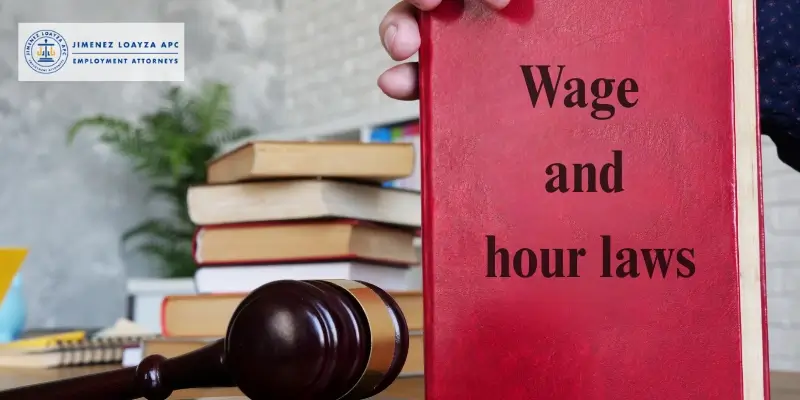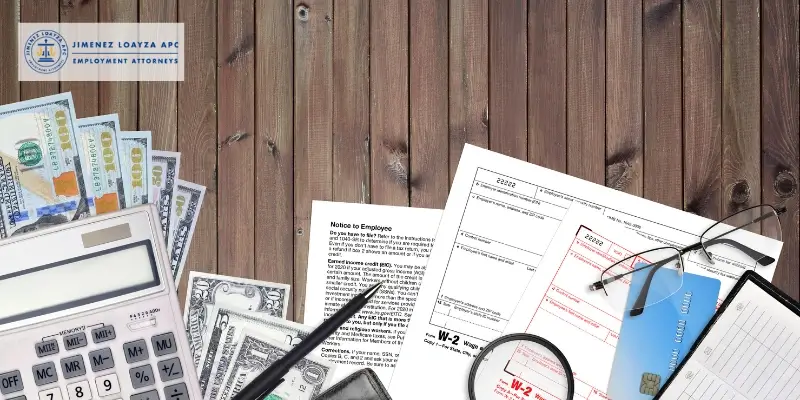
California is known for having some of the most comprehensive labor protections in the nation, and understanding how these rules work is important for both employees and employers. California leyes sobre salarios y horarios set strict standards for pay, overtime, and breaks to ensure workers are treated fairly and compensated properly for their time.
Whether you’re clocking long shifts, working remotely, or managing a team, knowing these rules can help prevent costly disputes and safeguard your rights in the workplace.
Quiénes somos
En Jiménez Loayza, APC, we believe every client deserves focused, individualized attention. Our award-winning attorneys bring a strategic, trial-ready mindset to each matter from the very start while ensuring that no detail goes overlooked.
By intentionally limiting the number of cases we accept, we’re able to provide tailored representation and responsive support. With deep experience in protecting workers’ rights, our team is committed to delivering strong advocacy, clear guidance, and results-oriented solutions for every client we serve.

Minimum Wage and Overtime Rights
One of the most important aspects of California’s wage and hour laws is minimum wage enforcement. Every employee is guaranteed a base wage that can’t be undercut. In addition, employees are entitled to overtime pay for all hours worked beyond the standard eight-hour day or forty-hour work week. Overtime rules are strictly enforced, and employers who don’t comply can face significant penalties.
Employees who work on weekends or holidays could also be entitled to additional compensation depending on the circumstances. Accurate record-keeping by employers is vital in these situations. Employees should keep personal records of their hours worked, pay stubs, and any communication with supervisors about hours to make sure they have evidence in case of a potential dispute.
Pausas para comer y descansar
California wage and hour laws also establish mandatory meal and rest breaks for employees. Employees working more than a certain number of hours per day are entitled to at least one unpaid meal break and one or more paid rest breaks, depending on the length of the shift. Employers are required to provide these breaks in a timely manner, and failure to comply can result in penalties or compensation owed to employees.
Meal and rest break rules exist to protect both fairness and employee well-being. Even if workers choose to skip their breaks, they still retain the right to be compensated when those breaks aren’t provided. In many situations, missed breaks entitle employees to premium pay or other additional compensation.
Wage Deductions and Misclassification
Another significant aspect of California wage and hour laws involves wage deductions and proper employee classification. Employers cannot make unauthorized deductions from an employee’s paycheck, and misclassifying employees as independent contractors can result in unpaid wages, missed benefits, and other legal complications. Understanding your classification is important when ensuring compliance and protecting your rights.
Misclassification can affect eligibility for overtime, meal and rest breaks, and other entitlements. Employees should review their employment agreements and consider consulting a wage and hour attorney if they suspect misclassification.
Record-Keeping and Documentation
In 2024, there were más de 47.000 atrasos wage theft claims in the state of California, which totaled around $4.600 millones anuales en wage losses. In fact, 41% de todos los trabajadores por hora en California afirman haber sufrido al menos una infracción laboral.
That’s why effective record-keeping is very important when it comes to wage disputes. Employees should maintain accurate logs of all hours they worked, their pay stubs, break schedules, and any communications with supervisors. Documentation is often the key to proving claims in wage and hour cases. Employers are also required to maintain records of employee hours and wages, and failure to do so can strengthen an employee’s claim in legal proceedings.
Hire a Wage & Hour Lawyer
If you find yourself dealing with a potential wage violation, it’s essential to hire a wage & hour lawyer. An experienced lawyer, like one from Jimenez Loayza, APC, can review your employment situation, evaluate any violations, and advise you on the right course of action. Wage and hour cases can be time-sensitive, so taking prompt action ensures that you’re preserving your rights.
Our team can help determine if you’re owed unpaid wages, calculate damages, and pursue claims through negotiation or litigation.

Preguntas frecuentes
Can Wage and Hour Laws Apply to Volunteers or Unpaid Interns?
Yes, wage and hour laws can apply to volunteers or unpaid interns. While traditional employment protections often target paid employees, unpaid interns, and volunteers could also have limited protections under certain circumstances. If an internship closely resembles a standard employment role, with set responsibilities and expectations, some wage and hour rights, like minimum wage and breaks, could apply.
How Do Wage and Hour Laws Interact With Remote or Gig Work?
Wage and hour laws still apply even when work is performed outside a traditional workplace. These laws govern pay, hours worked, and break entitlements regardless of location or work arrangement. The main concern is ensuring accurate tracking of time worked and proper classification of workers as employees or independent contractors. Misclassification or failure to monitor hours can lead to wage disputes.
Can Wage Disputes Affect Unemployment Benefits?
Yes, wage disputes can affect unemployment benefits. Wage disputes can influence the amount of unemployment benefits you get. If your earnings are underreported, delayed, or challenged because of a dispute, it can affect how your benefits are calculated and when they’re paid. Unresolved wage issues can lead to lower benefit amounts or temporary delays in approval.
Are There Protections for Employees Who Report Wage Violations?
Yes, there are protections for employees who report wage violations. Employees who report wage violations are protected by laws that prohibit retaliation from employers. This means an employer can’t legally fire, demote, reduce hours, or otherwise punish a worker for raising concerns about unpaid wages, overtime, or other labor violations. These protections apply whether the report is made internally or to a government agency.
Conclusive Call to Action: Protect Your Rights
Wage and hour issues can be stressful and financially damaging, but you don’t have to face them alone. Whether you’re dealing with unpaid wages, missed breaks, overtime violations, or misclassification, hiring an experienced legal team can make all the difference.
That’s why the team at Jimenez Loayza, APC, is committed to standing up for employees across California, offering clear advice, strategic advocacy, and a trial-ready approach to every case. Don’t wait to assert your rights.
Póngase en contacto con nosotros para concertar una consulta gratuita.